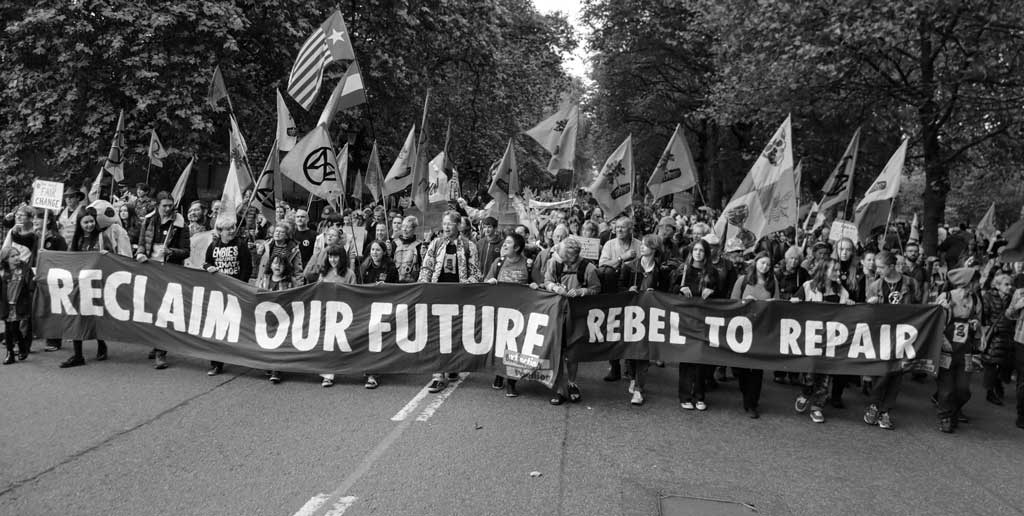

By Alex Rutherford
THE MOST recent UN reports into the impacts of climate change and the complete failure of attempts to solve the crisis make for depressing reading.
The report into ‘Impacts, Adaptation and Vulnerability’ concludes that climate change has already resulted in ‘widespread, pervasive impacts to ecosystems, people, settlements and infrastructure’ and that the damage caused by climate change is ‘increasingly irreversible’.
Increasing extreme weather events have exposed millions to acute food insecurity and reduced water security, while ocean warming and acidification have adversely affected fisheries. Water availability will continue to decrease across the globe, with a greater risk at higher temperatures. This will put further pressure on food production and lead to more premature deaths.
The largest impacts have been observed in Africa, Asia, and Latin America. Climate-related food shortages have led to malnutrition for low-income households, and roughly half the world’s population currently experience severe water scarcity due, at least in some part, to climate change.
Although limiting climate change to 1.5C would substantially reduce the projected impacts, it would not eliminate them. Even if this target were reached, which is unlikely, it would result in a ‘very high risk of extinction’ for between 3% and 14% of the Earth’s species. If the temperature rises further, the risk increases substantially.
Because these effects of climate change will occur simultaneously, and each will interact with many other factors, their impact will be compounded. The resulting cascading impacts can also trigger tipping points, leading to irreversible changes.
To have any chance of adapting to temperature rises, it is essential that we safeguard biodiversity. The report recommends ‘effective and equitable conservation of approximately 30%–50% of the earth’s land, freshwater and ocean areas, including currently near-natural ecosystems’.
Emissions Gap Report
The Emissions Gap Report is if anything more downbeat: updated national pledges since COP26 make a negligible difference to predicted 2030 emissions; policies currently in place would lead to a 2.8C rise by the end of the century; only an urgent, system-wide transformation can deliver the cuts needed to limit greenhouse gas emissions by 2030.
To get on track for limiting global warming to 1.5C, which is essential to prevent the worst impacts of climate change, emissions must be reduced by 45% by 2030 and continue to decline rapidly after that. Current commitments are projected to reduce global emissions by only 5–10% (assuming all pledges are fully implemented, which seems unlikely).
This is utterly insufficient and would raise global temperatures by between 2.4C and 2.6C, catastrophic for ecosystems, human civilisation and the planet. Although 19 of the G20 members have agreed to achieve net-zero, the credibility of these commitments and the feasibility of their policies are highly doubtful.
What the authors do not consider is the root cause of this inability to reduce emissions and end the climate crisis: the capitalist economy itself. The report calls for no new fossil fuel intensive infrastructure while advancing zero-carbon technologies, but such measures can never be implemented while the oil giants effectively control government policy.
Recognising that food production and distribution contributes around one-third of greenhouse gas emissions, the report proposes that ‘food systems will have to be rapidly transformed’ by ‘shifting diets, protecting natural ecosystems, improving food production and decarbonising food value chains’. It notes this will also ‘ensure healthy diets and food security for all’. If only the giant agribusiness corporations like Cargill and Monsanto were guided by such altruistic motivations!
The report lists what it calls ‘important actions to accelerate transformations’: removal of fossil fuel subsidies; stopping expansion of fossil fuel infrastructure; planning for a just fossil fuel phase-out; supporting zero-carbon industrial processes; and investing in zero-emissions transport infrastructure. What is lacking is any recognition that these demands can only be achieved by governments that defend the planet over profit.
Socialist solution
These reports vacillate wildly between naïve faith and abject despair. Inadvertently the authors have comprehensively demonstrated the inability of capitalism and its nation state structure to solve the crisis. We know what ‘solutions’ imperialism will offer: exporting the worst impacts of the climate catastrophe to the global south while imposing harsh immigration controls against the people affected by the crisis.
The capitalists have no intention of allowing their profits to be limited in the interests of sustainability, the global working class and peasantry. As defenders of capitalism, nation states will never take the measures needed. Beyond the entrenched interests of oil profiteers, agribusiness and other major polluters, global action on climate change is obstructed by the increasing competition between states.
Only a global socialist revolution, which places the economy under the democratic control of the working class, can pave the way for a transformation of production in the interests of society: a sustainable public transportation system, expropriation of the fossil fuel companies and major polluters; a democratic plan of production, including massive investment in the global south to ensure sustainable development.
An international revolution requires the building of an international revolutionary party—the Fifth International—to lead the masses in their struggle to overthrow capitalism. We must achieve this task urgently if we are to save our planet from impending destruction.